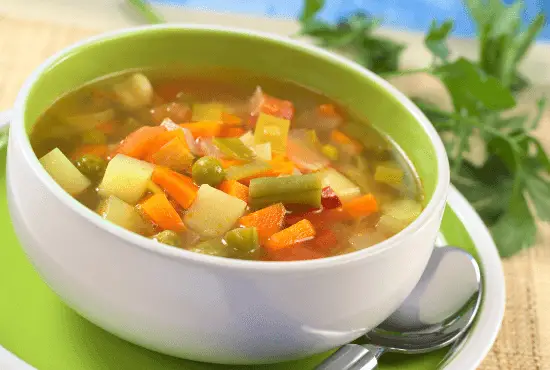Soup is a widely loved meal consumed throughout the world in one form or another. You can make Soup in a large quantity and freeze the unused portion so that you get to enjoy it whenever you want.
If you thawed the whole bowl of Soup but ended up having only a little portion, you might want to store the leftover soup again. So, pick out the best option and discover whether it is safe to refreeze the Soup?
You can refreeze Soup as many times as you want if you handle it properly before refreezing. Soups tolerate refreezing pretty well, so it will hold up great in the freezer. A refrozen batch of Soup will stay in the best state for 2-3 months. However, to achieve successful refreezing of Soup, you must thoroughly thaw and boil it, or else the Soup might spoil.
Here, you will find some concerns and tips regarding refreezing the soups. I will also be sharing the do’s and don’t s for different types of soups to be frozen to ensure that you get the best possible ways of storing/refreezing your soups.
Table of Contents
Is it Safe to Refreeze Soup?
Soup is one of those foods that maintain its original texture, despite being frozen again. It is safe to refreeze Soup. But, to refreeze the Soup successfully, you need to thaw it thoroughly.
Either you can thaw the Soup overnight in the refrigerator, or you can pop it into the microwave and let it thaw there on the recommended defrost settings.
Ensuring the Soup has thawed properly is very important as fully thawed soup freezes evenly. Moreover, it is less likely to develop freezer burns so that it maintains the flavor and overall quality in a better way.
It is also advised to bring the Soup to a boil before refreezing. Completely boiling the Soup before refreezing will help kill the bacteria that might have started growing while the Soup was thawing.
Before refreezing the Soup, you should remember that the Soup’s texture will turn more runny/watery upon refreezing. But, it will stay safe for use until you detect signs of spoilage.
What Soups Shouldn’t Be Refrozen?
While soups tolerate freezing pretty well, some types taste best when consumed fresh. These types of Soup are not as freezer-friendly as the others and might start spoiling upon refreezing.
Usually, chicken broth soups are considered more freezer-friendly.
On the other hand, cream-based soups do not react well in the freezer. These soups start to separate when tried to refreeze.
Some types of soups that do not handle refreezing well include:
Dairy-based soups
Soups that contain milk/cream as one of their main ingredients should not be refrozen. When you put these soups into the freezer, you’ll notice that the cream/milk has started separating. Moreover, dairy soups will have a sour smell/taste after separating.
Potato Soup
Potato soups are another delicacy of the winter season. However, you should avoid freezing/refreezing it. These soups are unable to hold on to the flavor or the texture. So you should avoid refreezing them.
Soups containing Grains/Pasta
Soups that contain pasta, rice, or other grains should also not be refrozen. Because when these soups are frozen and thawed, you’ll notice that the grains have become mushy. The Soup will also lose a lot of flavors and become unappealing. So refreezing such soups is strictly advised against.
Vegetable-enriched soups
Vegetable-rich soups are also prone to spoilage when you refreeze them. Moreover, the vegetables become excessively soft and mushy upon reheating the Soup. It makes the Soup extremely unappetizing. So, it would be best to finish the Soup the day you prepared it and discard the leftovers.
The Best Way to Refreeze Soup
If you want to extend the shelf-life of your favorite Soup, you can do so by following the instructions given below.
- Place the Soup on the stovetop over medium flame and wait till the Soup starts boiling.
- Take the boiling soup off the stove and let it sit until it reaches normal room temperature.
- Take the cooled-down Soup and pour it into a Ziploc, freezer-safe bag. Also, before sealing the bag, make sure to press out the extra air, as excessive air can lead to the formation of freezer burns and bacteria.
- To refreeze Soup in a container, fill the Soup to the top, leaving one-inch headspace in the container. If you see any steam rising from the Soup, wait until it cools down thoroughly and seal it tightly.
- Place the adequately sealed bag in another freezer-safe bag after removing as much air as possible. Double-wrapping will lower the risk of food contamination.
- Label the bags with the refreezing date and pop them in the coldest part of the freezer until ready to use.
Can You Refreeze Vegetable Soup?
Refreezing vegetable soup once is safe and it won’t cause any harm to your health. But, refreezing might significantly degrade the Soup’s taste, texture, and quality.
Since the vegetable soup contains a lot of veggies, you’ll notice that they have started turning mushy and have lost a lot of flavors. It will cause the Soup to become flavorless and unappetizing.
If you are not bothered by the compromised quality, you can go ahead and refreeze the Soup. However, do not try to refreeze the vegetable soup more than once.
Can You Refreeze Chicken Soup?
Chicken broth-based chicken soup is safe for refreezing. In fact, it is one of the soups that refreeze exceptionally well. It doesn’t contain a lot of vegetables, so the chances of spoilage are pretty low.
Moreover, the texture of these soups tends to hold great even after being refrozen 2-3 times.
However, the same cannot be said about cream-based chicken soups. While the chicken and the rest of the ingredients might hold their state well, the cream/milk separation after refreezing will ruin the Soup.
It is not safe to have Soup once the milk/cream has split as it can be potentially dangerous to you and your health. So it is advised to avoid refreezing cream-based soups.
How Long Can You Refreeze Soup?
The freezing/refreezing of Soup time length depends on various factors. It is best to look at the ingredient list before refreezing the Soup so that you may know if the ingredients used in it will stay good after refreezing or not.
Generally, most freezer-friendly soups will last 2-3 months if appropriately handled while refreezing. These soups will retain optimum flavor in this period. You won’t observe a notable change in the texture and quality.
Yet, some freezer-friendly soups might start spoiling before the recommended time limit even if you refreeze them well. In that case, you should immediately discard them.
How Many Times Can You Refreeze Soup?
Most soups can be safely refrozen 2-3 times. They will hold on to the overall quality quite well. But, if you try to refreeze them for more than 3x, you’ll notice a considerable deterioration in the flavor and texture. So, it’s advisable to avoid refreezing soups more than three times.
Conclusion
Most soups can be safely refrozen 2-3 times if you work carefully. Chicken/vegetable broth soups will hold the overall quality well and stay safe for use for almost three months.
However, remember that not all soups, especially cream-based soups, are not safe for refreezing. So it’s suggested to consume them fresh. Vegetable soup, potato, soups containing grains, etc., are also not safe for refreezing.
You can follow the step-by-step instructions discussed earlier to learn how to ensure the safe refreezing of soups.


